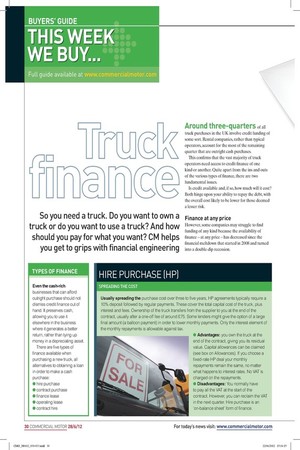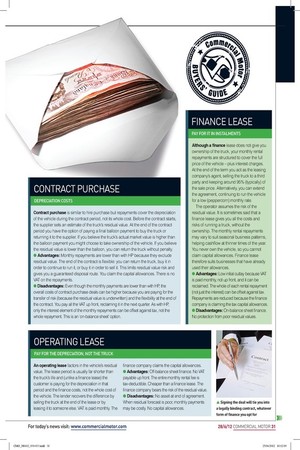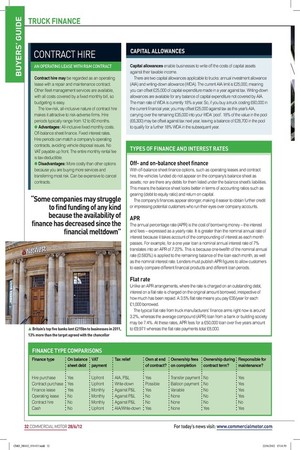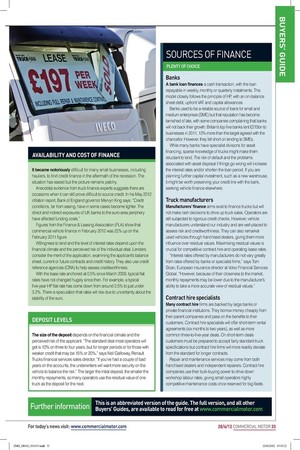THIS WEEK WE BUY...
Page 21

Page 22

Page 23

Page 24

If you've noticed an error in this article please click here to report it so we can fix it.
Full guide available at www.commercialmotor.com
So you need a truck. Do you want to own a truck or do you want to use a truck? And how should you pay for what you want? CM helps you get to grips with financial engineering
Around three-quarters of all truck purchases in the UK involve credit funding of some sort. Rental companies, rather than typical operators, account for the most of the remaining quarter that are outright cash purchases.
This confirms that the vast majority of truck operators need access to credit finance of one kind or another. Quite apart from the ins and outs of the various types of finance, there are two fundamental issues.
Is credit available and, if so, how much will it cost? Both hinge upon your ability to repay the debt, with the overall cost likely to be lower for those deemed a lesser risk.
Finance at any price
However, some companies may struggle to find funding of any kind because the availability of finance – at any price – has decreased since the financial meltdown that started in 2008 and turned into a double-dip recession.
TYPES OF FINANCE
Even the cash-rich businesses that can afford outright purchase should not dismiss credit finance out of hand. It preserves cash, allowing you to use it elsewhere in the business where it generates a better return, rather than tying up money in a depreciating asset.
There are five types of finance available when purchasing a new truck, all alternatives to obtaining a loan in order to make a cash purchase:
l hire purchase l contract purchase l finance lease l operating lease l contract hire
HIRE PURCHASE (HP)
SPREADING THE COST Usually spreading the purchase cost over three to five years, HP agreements typically require a 10% deposit followed by regular payments. These cover the total capital cost of the truck, plus interest and fees. Ownership of the truck transfers from the supplier to you at the end of the contract, usually after a one-off fee of around £75. Some lenders might give the option of a large final amount (a balloon payment) in order to lower monthly payments. Only the interest element of the monthly repayments is allowable against tax.
l Advantages: you own the truck at the end of the contract, giving you its residual value. Capital allowances can be claimed (see box on Allowances). If you choose a fixed-rate HP deal your monthly repayments remain the same, no matter what happens to interest rates. No VAT is charged on the repayments.
l Disadvantages: You normally have to pay all the VAT at the start of the contract. However, you can reclaim the VAT in the next quarter. Hire purchase is an ‘on-balance sheet’ form of finance.
CONTRACT PURCHASE
DEPRECIATION COSTS Contract purchase is similar to hire purchase but repayments cover the depreciation of the vehicle during the contract period, not its whole cost. Before the contract starts, the supplier sets an estimate of the truck’s residual value. At the end of the contract period you have the option of paying a final balloon payment to buy the truck or returning it to the supplier. If you believe the truck’s actual market value is higher than the balloon payment you might choose to take ownership of the vehicle. If you believe the residual value is lower than the balloon, you can return the truck without penalty.
• Advantages: Monthly repayments are lower than with HP because they exclude residual value. The end of the contract is flexible: you can return the truck, buy it in order to continue to run it, or buy it in order to sell it. This limits residual value risk and gives you a guaranteed disposal route. You claim the capital allowances. There is no VAT on the repayments.
• Disadvantages: Even though the monthly payments are lower than with HP, the overall costs of contract purchase deals can be higher because you are paying for the transfer of risk (because the residual value is underwritten) and the flexibility at the end of the contract. You pay all the VAT up front, reclaiming it in the next quarter. As with HP, only the interest element of the monthly repayments can be offset against tax, not the whole repayment. This is an ‘on-balance sheet’ option.
FINANCE LEASE
PAY FOR IT IN INSTALMENTS
Although a finance lease does not give you ownership of the truck, your monthly rental repayments are structured to cover the full price of the vehicle – plus interest charges. At the end of the term you act as the leasing company’s agent, selling the truck to a third party and keeping around 95% (typically) of the sale price. Alternatively, you can extend the agreement, continuing to run the vehicle for a low (peppercorn) monthly rate.
The operator assumes the risk of the residual value. It is sometimes said that a finance lease gives you all the costs and risks of running a truck, without the ownership. The monthly rental repayments may vary to suit seasonal business patterns, helping cashflow at thinner times of the year. You never own the vehicle, so you cannot claim capital allowances. Finance lease therefore suits businesses that have already used their allowances.
• Advantages: Low initial outlay because VAT is paid monthly, not up front, and it can be reclaimed. The whole of each rental repayment (not just the interest) can be offset against tax. Repayments are reduced because the finance company is claiming the tax capital allowances.
• Disadvantages: On-balance sheet finance. No protection from poor residual values.
OPERATING LEASE
PAY FOR THE DEPRECIATION, NOT THE TRUCK An operating lease factors in the vehicle’s residual value. The lease period is usually far shorter than the truck’s life and (unlike a finance lease) the customer is paying for the depreciation in that period and the finance costs, not the whole cost of the vehicle. The lender recovers the difference by selling the truck at the end of the lease or by leasing it to someone else. VAT is paid monthly. The finance company claims the capital allowances.
• Advantages: Off-balance sheet finance. No VAT payable up front. The entire monthly rental fee is tax-deductible. Cheaper than a finance lease. The finance company bears the risk of the residual value.
• Disadvantages: No asset at end of agreement. When residual forecast is poor, monthly payments may be costly. No capital allowances.
CONTRACT HIRE
AN OPERATING LEASE WITH R&M CONTRACT Contract hire may be regarded as an operating lease with a repair and maintenance contract. Other fleet management services are available, with all costs covered by a fixed monthly bill, so budgeting is easy.
The low-risk, all-inclusive nature of contract hire makes it attractive to risk-adverse firms. Hire periods typically range from 12 to 60 months.
• Advantages: All-inclusive fixed monthly costs. Off-balance sheet finance. Fixed interest rates. Hire periods can match a company’s operating contracts, avoiding vehicle disposal issues. No VAT payable up front. The entire monthly rental fee is tax-deductible.
• Disadvantages: More costly than other options because you are buying more services and transferring most risk. Can be expensive to cancel contracts.
CAPITAL ALLOWANCES
Capital allowances enable businesses to write off the costs of capital assets against their taxable income.
There are two capital allowances applicable to trucks: annual investment allowance (AIA) and writing-down allowance (WDA). The current AIA limit is £25,000, meaning you can offset £25,000 of capital expenditure made in a year against tax. Writing-down allowances are available for any balance of capital expenditure not covered by AIA. The main rate of WDA is currently 18% a year. So, if you buy a truck costing £60,000 in the current financial year, you may offset £25,000 against tax as this year’s AIA, carrying over the remaining £35,000 into your WDA ‘pool’. 18% of the value in the pool (£6,300) may be offset against tax next year, leaving a balance of £28,700 in the pool to qualify for a further 18% WDA in the subsequent year.
TYPES OF FINANCE AND INTEREST RATES Offand on-balance sheet finance
With off-balance sheet finance options, such as operating leases and contract hire, the vehicles funded do not appear on the company’s balance sheet as assets; nor are there any debts for them listed under the balance sheet’s liabilities. This means the balance sheet looks better in terms of accounting ratios such as gearing (debt to equity ratio) and return on capital.
The company’s finances appear stronger, making it easier to obtain further credit or impressing potential customers who run their eyes over company accounts.
APR
The annual percentage rate (APR) is the cost of borrowing money – the interest and fees – expressed as a yearly rate. It is greater than the nominal annual rate of interest because it takes account of the compounding of interest as each month passes. For example, for a one year loan a nominal annual interest rate of 7% translates into an APR of 7.22%. This is because one-twelfth of the nominal annual rate (0.583%) is applied to the remaining balance of the loan each month, as well as the nominal interest rate. Lenders must publish APR figures to allow customers to easily compare different financial products and different loan periods.
Flat rate
Unlike an APR arrangements, where the rate is charged on an outstanding debt, interest on a flat rate is charged on the original amount borrowed, irrespective of how much has been repaid. A 3.5% flat rate means you pay £35/year for each £1,000 borrowed.
The typical flat rate from truck manufacturers’ finance arms right now is around 3.2%, whereas the average compound (APR) loan from a bank or building society may be 7.4%. At these rates, APR fees for a £50,000 loan over five years amount to £9,971 whereas the flat rate payments total £8,000.
AvAilABiliTy ANd CosT oF FiNANCe
It became notoriously difficult for many small businesses, including hauliers, to find credit finance in the aftermath of the recession. The situation has eased but the picture remains patchy.
Anecdotal evidence from truck finance experts suggests there are occasions when it can still prove difficult to source credit. In his May 2012 inflation report, Bank of England governor Mervyn King says: “Credit conditions, far from easing, have in some cases become tighter. The direct and indirect exposures of UK banks to the euro-area periphery have affected funding costs.” Figures from the Finance & Leasing Association (FLA) show that commercial vehicle finance in February 2012 was 22% up on the February 2011 figure.
Willingness to lend and the level of interest rates depend upon the financial climate and the perceived risk of the individual deal. Lenders consider the merit of the application, examining the applicant’s balance sheet, current or future contracts and credit history. They also use credit reference agencies (CRA) to help assess creditworthiness.
With the base rate anchored at 0.5% since March 2009, typical flat rates have not changed hugely since then. For example, a typical five-year HP flat rate has come down from around 3.5% to just under 3.2%. There is speculation that rates will rise due to uncertainty about the stability of the euro.
deposiT levels
The size of the deposit depends on the financial climate and the perceived risk of the applicant. “The standard deal most operators will get is 10% on three to four years, but for longer periods or for those with weaker credit that may be 15% or 20%,” says Neil Galloway, Renault Trucks financial services sales director. “If you’ve had a couple of bad years on the accounts, the underwriters will want more security on the vehicle to balance the risk.” The larger the initial deposit, the smaller the monthly repayments, so many operators use the residual value of one truck as the deposit for the next.
SOURCES OF FINANCE
plenty oF choice
Banks
A bank loan finances a cash transaction, with the loan repayable in weekly, monthly or quarterly instalments. This model closely follows the principle of HP, with an on-balance sheet debt, upfront VAT and capital allowances.
Banks used to be a reliable source of loans for small and medium enterprises (SME) but that reputation has become tarnished of late, with some companies complaining that banks will not back their growth. Britain’s top five banks lent £215bn to businesses in 2011, 13% more than the target agreed with the chancellor. However, they fell short on lending to SMEs.
While many banks have specialist divisions for asset financing, sparse knowledge of trucks might make them reluctant to lend. The risk of default and the problems associated with asset disposal if things go wrong will increase the interest rates and/or shorten the loan period. If you are planning further capital investment, such as a new warehouse, it might be worth preserving your credit line with the bank, seeking vehicle finance elsewhere.
Truck manufacturers
Manufacturers’ finance arms exist to finance trucks but will not make rash decisions to drive up truck sales. Operators are still subjected to rigorous credit checks. However, vehicle manufacturers understand our industry and are well-placed to assess risk and creditworthiness. They can also remarket used vehicles through franchised dealers, giving them more influence over residual values. Maximising residual values is crucial for competitive contract hire and operating lease rates.
“Interest rates offered by manufacturers do not vary greatly from rates offered by banks or specialist firms,” says Tom Sloan, European insurance director at Volvo Financial Services Global. “However, because of their closeness to the market, monthly repayments may be lower due to the manufacturer’s ability to take a more accurate view of residual values.”
Contract hire specialists
Many contract hire firms are backed by large banks or private financial institutions. They borrow money cheaply from their parent companies and pass on the benefits to their customers. Contract hire specialists will offer short-term rental agreements (six months to two years), as well as more common three-to-five-year deals. On short-term deals customers must be prepared to accept fairly standard truck specifications but contract hire firms will more readily deviate from the standard for longer contracts.
Repair and maintenance services may come from both franchised dealers and independent repairers. Contract hire companies use their bulk-buying power to drive down workshop labour rates, giving small operators highly competitive maintenance costs once reserved for big fleets.










































